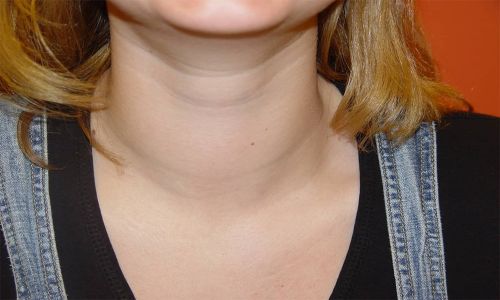Goiter surgery is a procedure that involves removing the thyroid gland. The process after goiter surgery varies depending on the person's health condition. Additionally, the type of surgery performed and the extent of the surgical intervention also affect the healing process.
How Does the Healing Process Progress After Goiter Surgery?
 Goiter surgery involves removing the thyroid gland. The postoperative period varies depending on the person's health condition. Additionally, the type of surgery performed and the extent of the intervention also affect the healing process. Each patient's recovery process is different. Most people can start doing their daily activities again in a few weeks.
In the first days, mild pain in the throat and difficulty in swallowing may occur. This condition is due to the nerves and tissues in the throat being affected during the surgery. It is usually temporary. It will get better within a few weeks.
Voice changes may last longer in some patients, but are rarely permanent. During the recovery process, the painkillers prescribed by the doctor help relieve discomfort.
Sutures should be cared for carefully to reduce the risk of infection in the surgical area. Postoperative dressing should be done as recommended by the doctor. The wound should be kept clean. Additionally, heavy physical activities should be avoided. A lifestyle suitable for the healing process should be adopted.
Nutrition is also important in the healing process. Light and liquid foods should be consumed in the first days. Consuming adequate amounts of water also contributes to recovery. After goiter surgery, thyroid hormone levels should be checked. If necessary, hormone supplements may be recommended by the doctor.
As a result, the recovery process after goiter surgery is specific to the individual. Regular doctor checks and proper care ensure the healthy progress of the process.
Goiter surgery involves removing the thyroid gland. The postoperative period varies depending on the person's health condition. Additionally, the type of surgery performed and the extent of the intervention also affect the healing process. Each patient's recovery process is different. Most people can start doing their daily activities again in a few weeks.
In the first days, mild pain in the throat and difficulty in swallowing may occur. This condition is due to the nerves and tissues in the throat being affected during the surgery. It is usually temporary. It will get better within a few weeks.
Voice changes may last longer in some patients, but are rarely permanent. During the recovery process, the painkillers prescribed by the doctor help relieve discomfort.
Sutures should be cared for carefully to reduce the risk of infection in the surgical area. Postoperative dressing should be done as recommended by the doctor. The wound should be kept clean. Additionally, heavy physical activities should be avoided. A lifestyle suitable for the healing process should be adopted.
Nutrition is also important in the healing process. Light and liquid foods should be consumed in the first days. Consuming adequate amounts of water also contributes to recovery. After goiter surgery, thyroid hormone levels should be checked. If necessary, hormone supplements may be recommended by the doctor.
As a result, the recovery process after goiter surgery is specific to the individual. Regular doctor checks and proper care ensure the healthy progress of the process.
What Should Be Considered After Goiter Surgery?
 Things to consider during the recovery period after goiter surgery reduce the risk. In this way, the healing process ends faster. It also goes smoothly. It is very important to follow the doctor's recommendations and observe yourself well.
Wound care in the surgical area should be done meticulously to prevent the risk of infection. Dressing should be done as recommended by the doctor. The wound should be kept clean. Signs of infection such as redness, swelling, or discharge may occur. A doctor should be consulted as soon as it is noticed.
Heavy physical activities and sudden neck movements should be avoided. Overloading the body during the healing process may increase the risk of complications.
Hoarseness is a common condition after surgery and is usually temporary. However, if it continues, you should consult your doctor. Resting your voice and not straining it unnecessarily helps the healing process.
Nutrition is another important issue to consider after surgery. Light and liquid foods should be consumed in the first days. Adequate fluid intake both protects general health and supports healing. Additionally, your doctor will check your thyroid hormone levels regularly. If there is a hormone imbalance, thyroid hormone supplements may be necessary.
Doctor's check-ups are the most effective way to ensure that recovery is progressing healthily. The medications given during this process should be taken regularly and if any problems occur, your healthcare provider should be consulted without delay. Proper care and attention after goiter surgery ensures that the recovery process goes smoothly.
Things to consider during the recovery period after goiter surgery reduce the risk. In this way, the healing process ends faster. It also goes smoothly. It is very important to follow the doctor's recommendations and observe yourself well.
Wound care in the surgical area should be done meticulously to prevent the risk of infection. Dressing should be done as recommended by the doctor. The wound should be kept clean. Signs of infection such as redness, swelling, or discharge may occur. A doctor should be consulted as soon as it is noticed.
Heavy physical activities and sudden neck movements should be avoided. Overloading the body during the healing process may increase the risk of complications.
Hoarseness is a common condition after surgery and is usually temporary. However, if it continues, you should consult your doctor. Resting your voice and not straining it unnecessarily helps the healing process.
Nutrition is another important issue to consider after surgery. Light and liquid foods should be consumed in the first days. Adequate fluid intake both protects general health and supports healing. Additionally, your doctor will check your thyroid hormone levels regularly. If there is a hormone imbalance, thyroid hormone supplements may be necessary.
Doctor's check-ups are the most effective way to ensure that recovery is progressing healthily. The medications given during this process should be taken regularly and if any problems occur, your healthcare provider should be consulted without delay. Proper care and attention after goiter surgery ensures that the recovery process goes smoothly.
Nutrition Recommendations After Goiter Surgery
 Post-operative nutrition is of great importance to support the healing process and strengthen the body. Correct nutritional choices in the postoperative period accelerate wound healing. It also reduces the risk of complications. Soft and liquid foods should be preferred in the first days, and a normal diet should be made over time.
After the surgery, throat sensitivity and difficulty swallowing may occur. Therefore, foods that are easy to digest should be consumed. Soup, pureed vegetables and yoghurt are ideal options. Additionally, drinking adequate amounts of water keeps the body hydrated and supports the healing process. It is recommended to increase daily fluid consumption.
Foods rich in protein are essential for tissue repair and wound healing. Chicken, fish, eggs are rich in protein. These protein sources should be included in your nutrition plan during the recovery process.
Fresh vegetables and fruits provide the vitamins and minerals needed. Vitamin C strengthens the immune system. It also accelerates healing.
Processed foods and excessive salt consumption should be avoided. Excessively fatty foods should not be consumed. These types of foods can negatively affect the healing process. It may disrupt thyroid functions. You should also pay attention to iodine intake as recommended by your doctor.
Finally, your thyroid hormone levels are evaluated during doctor's visits. When necessary, thyroid hormone supplements should be taken regularly. A balanced and healthy nutrition plan supports recovery after goiter surgery. It also protects your general health.
Post-operative nutrition is of great importance to support the healing process and strengthen the body. Correct nutritional choices in the postoperative period accelerate wound healing. It also reduces the risk of complications. Soft and liquid foods should be preferred in the first days, and a normal diet should be made over time.
After the surgery, throat sensitivity and difficulty swallowing may occur. Therefore, foods that are easy to digest should be consumed. Soup, pureed vegetables and yoghurt are ideal options. Additionally, drinking adequate amounts of water keeps the body hydrated and supports the healing process. It is recommended to increase daily fluid consumption.
Foods rich in protein are essential for tissue repair and wound healing. Chicken, fish, eggs are rich in protein. These protein sources should be included in your nutrition plan during the recovery process.
Fresh vegetables and fruits provide the vitamins and minerals needed. Vitamin C strengthens the immune system. It also accelerates healing.
Processed foods and excessive salt consumption should be avoided. Excessively fatty foods should not be consumed. These types of foods can negatively affect the healing process. It may disrupt thyroid functions. You should also pay attention to iodine intake as recommended by your doctor.
Finally, your thyroid hormone levels are evaluated during doctor's visits. When necessary, thyroid hormone supplements should be taken regularly. A balanced and healthy nutrition plan supports recovery after goiter surgery. It also protects your general health.


